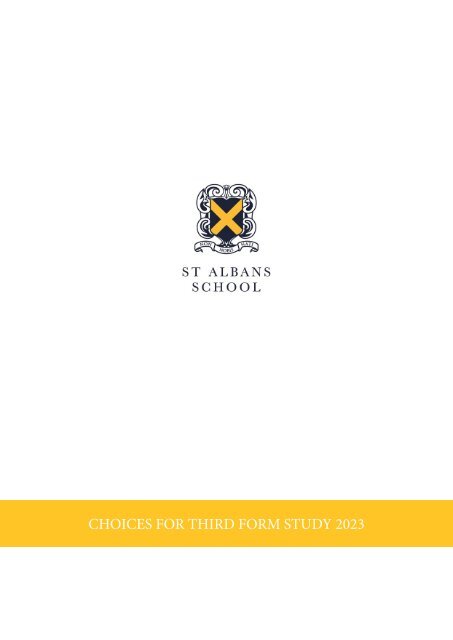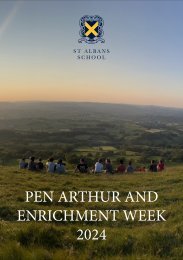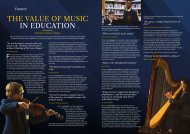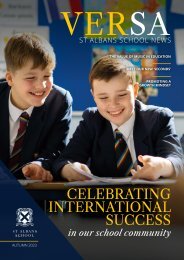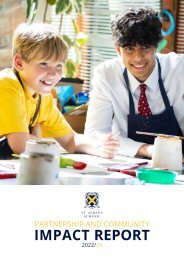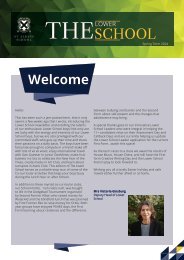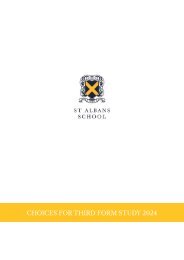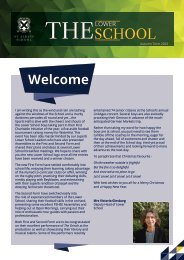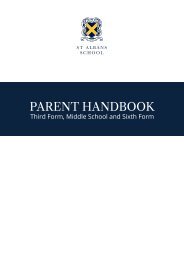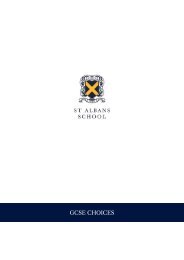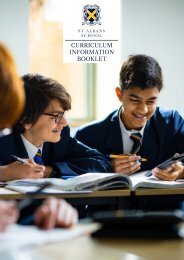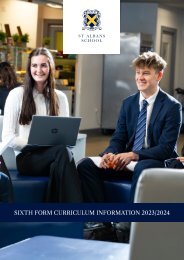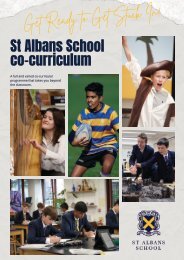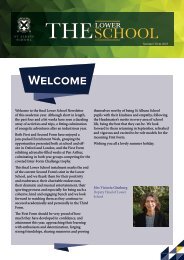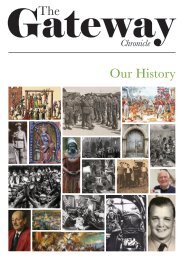Third Form Choices Booklet 2023
You also want an ePaper? Increase the reach of your titles
YUMPU automatically turns print PDFs into web optimized ePapers that Google loves.
CHOICES FOR THIRD FORM STUDY <strong>2023</strong>
CONTENTS<br />
ART AND DESIGN 4<br />
COMPUTER SCIENCE 5<br />
DESIGN TECHNOLOGY 6<br />
DRAMA 7<br />
LATIN 8<br />
MODERN LANGUAGES 9<br />
MUSIC 11<br />
2
ART AND DESIGN<br />
INCLUDES:<br />
• Drawing<br />
• Installation<br />
• Lens/Light-based media<br />
• Mixed media<br />
• Land Art<br />
• Printing<br />
• Painting<br />
• Sculpture<br />
The GCSE has TWO components:<br />
Component 1: 60%<br />
A portfolio of practical work showing a personal response<br />
to either a starting point, brief, scenario, or stimulus.<br />
Component 2: Externally Set Task 40%<br />
An early release paper will be issued in January of the final<br />
GCSE year, providing learners with a choice of themes, each<br />
with a range of written and visual starting points.<br />
ART & DESIGN IN THE THIRD FORM<br />
This a foundation year introducing pupils to a range of new<br />
media and techniques, building upon and developing the<br />
skills acquired in the Lower School whilst preparing future<br />
candidates for the GCSE course. Techniques covered on the<br />
course have included Portraiture, Printmaking, Sculpture<br />
and Ceramics.<br />
ART & DESIGN IN THE FOURTH FORM<br />
Pupils begin the portfolio component, which counts<br />
towards 60% of their overall GCSE grade. They are expected<br />
to attend the Art Clinics.<br />
ART & DESIGN IN THE FIFTH FORM<br />
Pupils develop and refine their coursework portfolios<br />
completing them in the December of their final GCSE year.<br />
They then begin the Externally Set Task in preparation for<br />
a 10-hour Art Examination approximately 8-10 weeks later.<br />
Pupils are expected to attend the Art Clinics.<br />
3
COMPUTER SCIENCE<br />
Computer Science is an optional subject in the <strong>Third</strong> <strong>Form</strong>.<br />
Hopefully, the work covered in the Second <strong>Form</strong> will have<br />
given you a good idea of what the subject entails.<br />
Q. What will we cover in the <strong>Third</strong> <strong>Form</strong>?<br />
We will further develop and extend topics covered in the<br />
Second <strong>Form</strong>.<br />
• Computer Architecture – how a computer works<br />
from basic input and output to binary and logic gates<br />
• Security Aspects of Computing – biometrics,<br />
malware, and cryptography<br />
• Flowcharting – creating graphical representations of<br />
algorithms<br />
• Programming – text-based programming with<br />
Python<br />
We will also take part in Bebras and various other<br />
competitions.<br />
Q. Will we be building computers?<br />
No, we will look inside a computer but no more than that.<br />
Q. Can I have more information or see some<br />
teaching notes?<br />
Yes, book a meeting with Ms D’Cruz (rdcruz@st-albans.<br />
herts.sch.uk) and/or talk to a current <strong>Third</strong> <strong>Form</strong> Computer<br />
Science pupil.<br />
Q. Should I choose this subject?<br />
As with all your choices, you should choose this subject if<br />
you have a) enjoyed Computing lessons in the Second <strong>Form</strong><br />
and b) been successful in those topics. We will do lots of<br />
programming but there is also lots of theory.<br />
Q. If I choose Computer Science in the <strong>Third</strong><br />
<strong>Form</strong>, do I have to take it as a GCSE?<br />
No. The aim of the <strong>Third</strong> <strong>Form</strong> course is to give pupils a<br />
good overall grounding in Computer Science. We will cover<br />
things like malware and biometrics that are very relevant<br />
in the world today, regardless of what subjects you study<br />
at GCSE. Programming requires good problem-solving<br />
skills, systematic thinking, and resilience, which are useful<br />
in all your studies.<br />
Q. If I don’t choose Computer Science in the <strong>Third</strong><br />
<strong>Form</strong>, can I still take it as a GCSE option?<br />
No. Although we do not start the IGCSE in <strong>Third</strong> <strong>Form</strong>, we<br />
do cover some prerequisites including Python.<br />
4
DESIGN AND TECHNOLOGY<br />
5
DRAMA<br />
If you decide to take Drama as an option in <strong>Third</strong> <strong>Form</strong>, you<br />
will be given the opportunity to perform practical work to<br />
a live audience and to go on a theatre trip.<br />
DRAMA IN THE THIRD FORM<br />
This year is designed to enhance practical skills as well as<br />
the ability to analyse and evaluate work both orally and in<br />
written form. Taking Drama in <strong>Third</strong> <strong>Form</strong> equips pupils<br />
with the tools needed for the GCSE course. Topics covered<br />
include scripted plays, devising theatre, physical theatre,<br />
technical theatre, duologues, verbatim, and the study of<br />
different theatre practitioners.<br />
DRAMA IN THE FOURTH FORM<br />
Pupils will gain more practical experience in performing<br />
to a live audience and will attend a theatre trip. They will<br />
explore the play DNA by Dennis Kelly, which features on<br />
the final written exam. Component 1: Devising Drama is<br />
also completed in the Fourth <strong>Form</strong> and contributes 40%<br />
of the marks for the total GCSE. Pupils will be required<br />
to devise a play from a range of stimuli and will produce<br />
coursework alongside the practical rehearsals. They will<br />
also take part in a practical workshop with a professional<br />
theatre company.<br />
DRAMA IN THE FIFTH FORM<br />
Pupils start the year working on Component 2: Performance<br />
from Text. This unit requires pupils to perform two separate<br />
extracts from a chosen play and this contributes 20% of<br />
the marks for the total GCSE. Pupils will attend at least<br />
two theatre trips; one of these will be written about in the<br />
end-of-year exam alongside the set play. Component 3:<br />
Theatre makers in Practice will be covered throughout the<br />
entire GCSE course and is worth 40% of the total GCSE.<br />
Pupils will also take part in a practical workshop with a<br />
professional theatre company.<br />
For further information about the course contact<br />
ljhanneghanbirt@st-albans.herts.sch.uk.<br />
6
LATIN<br />
WHY DO LATIN?<br />
The Latin course continues to develop pupils’ knowledge<br />
of syntax, grammar and vocabulary while simultaneously<br />
providing enhanced knowledge of Roman mythology and<br />
history, through translation and background information.<br />
The study of Latin offers many advantages, including:<br />
• The training of an analytical and enquiring mind<br />
• An introduction to the rhetorical and literary devices<br />
used by Roman authors<br />
• The opportunity to see the development of Romance<br />
languages from Latin<br />
• A developed understanding of English vocabulary and<br />
syntax<br />
COURSE CONTENT<br />
All pupils start afresh with the new GCSE textbook, Latin<br />
to GCSE Part I, cementing their knowledge of grammar<br />
and syntax, being introduced to GCSE vocabulary and<br />
GCSE style translations, as well as simple English into<br />
Latin sentences. The passages in the textbook cover the<br />
mythological history of the Roman nation from The Fall of<br />
Troy, with abridged stories from Virgil’s epic the Aeneid, to<br />
the period of Kingly rule and the early days of the Republic.<br />
They then move on to Latin to GCSE Part II, learning more<br />
complex clauses and constructions.<br />
All pupils do a fortnight of Ancient Greek at the start of the<br />
Spring Term, familiarising themselves with the alphabet and<br />
looking at its continuing linguistic relevance, in anticipation<br />
of their GCSE <strong>Choices</strong>.<br />
The boys are treated to a visit from the Roman Soldiers,<br />
learning about basic military training, functions of Roman<br />
weaponry, battle tactics and military strategies, as well as<br />
a session on Roman medical procedures, carried out on<br />
the battlefield.<br />
Which famous people have studied Latin and what<br />
do they do now?<br />
Tom Hiddleston,<br />
Actor<br />
Frank Lampard,<br />
Footballer/writer<br />
Chris Martin,<br />
Musician<br />
Alex Horne, Alex, the mastermind behind Taskmasterm and<br />
the Horne Section, studied Classics at Sidney Sussex College,<br />
Cambridge.<br />
7
MODERN LANGUAGES<br />
FRENCH<br />
The <strong>Third</strong> <strong>Form</strong> French course is based on the digital Studio<br />
3 textbook and pupils will cover a range of topics including<br />
free time, holidays, work, and health. Pupils will complete<br />
reading, writing, speaking, and listening exercises on the<br />
course topics. There will also be a focus on grammatical<br />
accuracy and pupils will have covered the present, the<br />
perfect, the imperfect and the future tenses by the end of<br />
the year. Vocabulary learning will play a key role and there<br />
will be weekly vocabulary tests.<br />
Pupils will have the opportunity to use German for<br />
real purposes by developing the links we have already<br />
established with our partner school, the Christian-Wirth-<br />
Schule in Usingen, and taking part in the German Exchange<br />
trip.<br />
MANDARIN CHINESE<br />
This course is available for pupils who currently study the<br />
subject in the Second <strong>Form</strong>. Lessons will continue to be<br />
based on the Jìn Bù 2 textbook. The vocabulary for each<br />
chapter will be more comprehensive, meaning a greater<br />
number of words and characters will be taught. The new<br />
sentence structures will enable pupils to be more flexible<br />
and creative when applying the language. With regular<br />
practice, pupils will be able to communicate with greater<br />
fluency and be able to speak more naturally. At the end<br />
of this course, pupils will be able to talk about their daily<br />
activities, past and future events; give directions; and have<br />
conversations on topics such as weather, holidays, local<br />
amenities, food and drink, shopping, and their future<br />
aspirations.<br />
GERMAN<br />
Pupils who currently study German in the Second <strong>Form</strong><br />
may choose to continue their further study of the language<br />
in the <strong>Third</strong> <strong>Form</strong>. The German course builds on the<br />
knowledge and skills learnt in Second <strong>Form</strong> and stretches<br />
pupils to practise and master a range of complex language.<br />
Topics include role models, music, ambitions for the future,<br />
describing their childhood and discussing rights and<br />
responsibilities. There will also be a focus on grammatical<br />
accuracy and pupils will have covered all the basic structures<br />
and tenses by the end of the year. Vocabulary learning will<br />
play a key role and there will be weekly vocabulary tests<br />
ensuring a smooth transition towards study at GCSE level.<br />
SPANISH<br />
This route is available to all current Second <strong>Form</strong> pupils<br />
already studying Spanish. These pupils will follow the Viva<br />
3 course book. This course builds upon the basics taught in<br />
pupils’ first year of Spanish and expands their knowledge<br />
of the language. A particular emphasis is placed upon the<br />
acquisition of grammar to enable pupils to be well prepared<br />
for the IGCSE, should they wish to take it.<br />
The department subscribes to an online resource bank,<br />
which aids pupils in independent learning as well as<br />
allowing them to practice listening exercises on personal<br />
devices. Both <strong>Third</strong> <strong>Form</strong> courses cover the listening,<br />
reading, writing and speaking skills necessary for the<br />
IGCSE. To achieve a high grade, pupils must be prepared<br />
8
to work hard and to commit to memory a wide range of<br />
vocabulary and grammatical patterns.<br />
and develop a good insight into the fascinating Chinese<br />
culture. The course will enable pupils to communicate<br />
confidently in a range of everyday situations in written and<br />
spoken Chinese, as well as developing the skills needed to<br />
understand Chinese written texts.<br />
Challenging but rewarding, this course will suit those who<br />
have a passion for languages and want to learn more, and<br />
who are willing to work hard to achieve this goal.<br />
BEGINNERS’ COURSE IN SPANISH<br />
The beginners’ set follows the Viva 1 course book, which<br />
introduces the Spanish language and its grammar. Over<br />
the year, pupils will build their confidence and ability in<br />
the language. A strong emphasis is placed upon grammar<br />
as this will be the basis for IGCSE study. Pupils in this<br />
<strong>Third</strong> <strong>Form</strong> set will have two homeworks per week. One<br />
is a vocabulary learning homework and the second will be<br />
either grammar, writing or comprehension.<br />
BEGINNERS’ COURSES IN GERMAN,<br />
MANDARIN CHINESE AND SPANISH<br />
Pupils who join the School in the <strong>Third</strong> <strong>Form</strong> and have<br />
no prior knowledge of German, Mandarin Chinese or<br />
Spanish have the option of joining a beginners’ set in these<br />
languages. These sets will work at an accelerated pace in<br />
the <strong>Third</strong> <strong>Form</strong> and will cover the necessary material to be<br />
ready to join regular IGCSE classes in the Fourth <strong>Form</strong>. Any<br />
pupil studying a beginners’ course must do so in addition<br />
to studying another modern language.<br />
BEGINNERS’ COURSE IN GERMAN<br />
Pupils who are joining the School in the <strong>Third</strong> <strong>Form</strong> have<br />
the option of following an accelerated beginners’ course<br />
in German. This one-year course will focus on quickly<br />
acquiring the basics before moving on to more advanced<br />
grammar and topics. There will be a particular focus on<br />
the rapid learning of grammar in order to help pupils to<br />
express their ideas quickly and accurately. Pupils will have<br />
two homework tasks each week: one to learn vocabulary<br />
and one written task such as a reading or grammar exercise.<br />
By the end of the <strong>Third</strong> <strong>Form</strong>, pupils following this course<br />
will be prepared to take the language at GCSE level as part<br />
of regular German classes.<br />
BEGINNERS’ COURSE IN MANDARIN<br />
CHINESE<br />
This one-year course will follow the topic-based Jìn<br />
Bù textbooks which provide a good progression route<br />
towards the study of GCSE Mandarin Chinese. Pupils will<br />
learn vocabulary and grammar used in Chinese daily life<br />
9
MUSIC<br />
What will I study?<br />
One lesson a week is based on a range of topics based<br />
around a textbook called Fortissimo, all designed to<br />
broaden your knowledge of music, and your listening and<br />
understanding skills. Examples of these include “Rhythm”,<br />
“Shaping Melodies”, “Tempo and dynamics” and “Music<br />
with a drone”.<br />
The second lesson is designed to develop your theory and<br />
aural skills, and your general musicianship. This includes<br />
giving performances to the class (approximately once a<br />
term).<br />
In the Spring Term, half a term is spent producing a<br />
composition project, using Sibelius software. At the end of<br />
the half term the class performs the projects.<br />
Also in the Spring Term, half a term is spent using Logic<br />
on the iMacs to produce and master a song, developing<br />
sequencing and mastering skills.<br />
How will I be assessed?<br />
There is a listening exam in the Summer Term, which will<br />
be one hour long and will be based on the topics we have<br />
studied during the year, and the skills we have developed.<br />
Please note that there is no performing or composing<br />
element to this.<br />
At the end of each half term there will also be a 20-minute<br />
test covering all topics studied during that period.<br />
What level do I need to be at to take the course?<br />
Although there is no requirement for a minimum standard<br />
on an instrument, you will be expected to perform to the<br />
class for a minimum of 1 minute. This can be any standard,<br />
and could, for instance, include singing a simple song, but<br />
it is an expectation that a performance happens.<br />
You will find the course extremely difficult if you cannot<br />
read music, at least on a treble clef.<br />
Can I go on to study IGCSE Music if I do not take<br />
<strong>Third</strong> <strong>Form</strong> Music?<br />
In theory yes, but in practice, you will be in a much weaker<br />
position than those who have spent their <strong>Third</strong> <strong>Form</strong><br />
learning and developing key skills.<br />
If you have any further questions, please email Mr Young<br />
at thyoung@st-albans.herts.sch.uk.<br />
10
11


